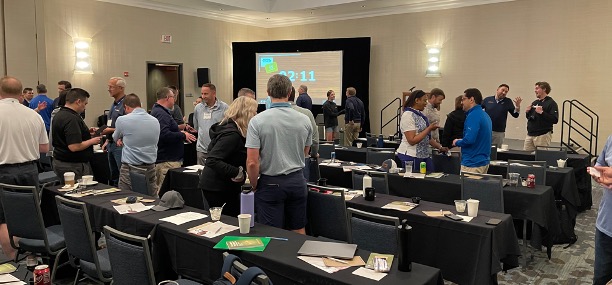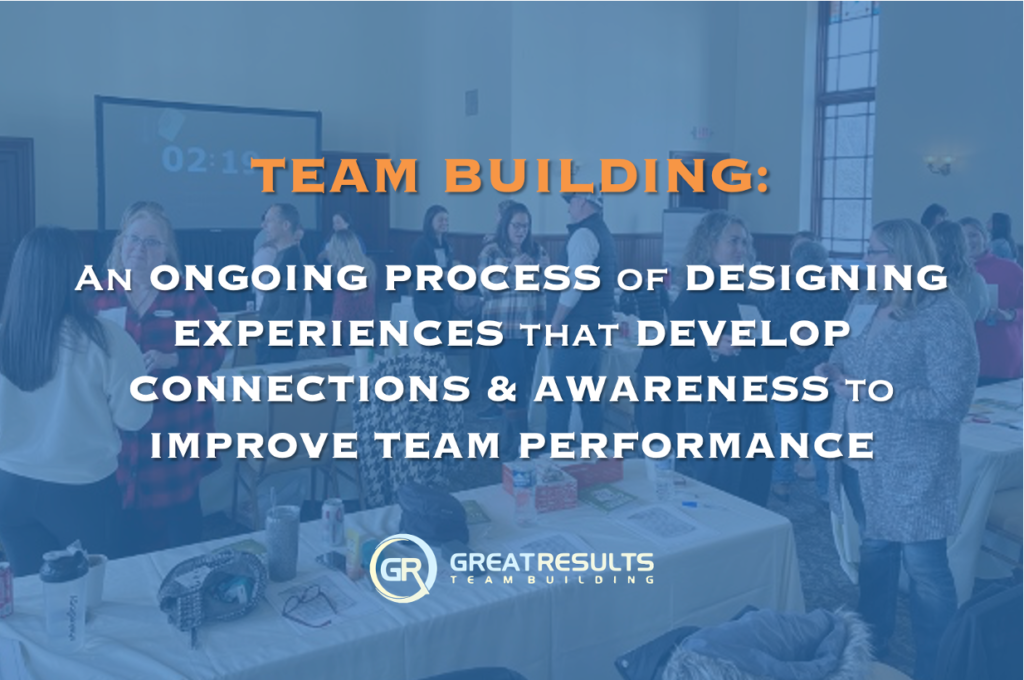Experience alone won’t make your people better leaders or teammates –
Only AWARENESS will.
Team building events are often seen as just fun and games, a break from the usual office routine. However, the best team building events are much more than just a diversion.
They are a powerful form of leadership development training that can transform team dynamics and boost overall organizational performance.
Team building is crucial element of leadership development, and there are five specific benefits that these activities offer for growing your organization.
The BEST team building events deliver essential insights – while fostering connections, enhancing communication, and building trust among team members. When individuals feel connected to their colleagues, they are more likely to collaborate effectively, share ideas, and support each other in achieving common goals.
Moreover, team building events provide a unique opportunity for individuals to step out of their daily roles and see each other in a different light. This fresh perspective can uncover hidden talents and strengths, paving the way for personal growth and team improvement.
When facilitated by a skilled professional, team building activities can yield deep insights and lasting positive changes – and there are five specific benefits for leadership development.
1. Enhancing Self-Awareness and Emotional Intelligence
Why It Matters:
Self-awareness is the cornerstone of effective leadership. Leaders who understand their strengths, weaknesses, and emotional triggers are better equipped to manage themselves and others. Team building activities often involve reflective exercises and feedback sessions that help participants gain a clearer understanding of their behavior and its impact on the team.
How It Works:
A talented team building facilitator will design activities that challenge participants to reflect on their experiences and interactions. For example, a trust-building exercise where participants must rely on each other to complete a task can reveal how they handle stress, trust, and communication. Through guided discussions and debriefs, individuals can gain insights into their behavior and develop strategies for improvement.
Impact on Leadership Development:
By enhancing self-awareness, leaders become more emotionally intelligent. They learn to manage their emotions, communicate more effectively, and build stronger relationships with their team members. This emotional intelligence is crucial for creating a positive and productive team culture.
2. Improving Communication Skills
Why It Matters:
Clear and effective communication is vital for any team’s success. Misunderstandings and poor communication can lead to conflicts, decreased productivity, and a lack of trust. Team building activities provide a safe space for individuals to practice and refine their communication skills.
How It Works:
Activities such as problem-solving challenges and role-playing scenarios require participants to articulate their ideas clearly, listen actively, and collaborate with others. A facilitator can observe these interactions and provide constructive feedback to help individuals improve their communication techniques.
Impact on Leadership Development:
Leaders who communicate effectively can convey their vision, motivate their team, and resolve conflicts efficiently. Improved communication skills also enhance transparency and trust within the team, leading to better collaboration and higher overall performance.
3. Fostering Collaboration and Teamwork
Why It Matters:
Successful teams are built on collaboration and mutual support. Team building activities are designed to break down silos, encourage cooperation, and strengthen the sense of community within a group.
How It Works:
Activities like escape rooms, team sports, or collaborative problem-solving tasks require participants to work together towards a common goal. These experiences highlight the importance of each team member’s contribution and the value of diverse perspectives.
Impact on Leadership Development:
Leaders who understand the dynamics of effective teamwork can foster a collaborative environment in their workplace. They learn to recognize and leverage the strengths of their team members, delegate tasks appropriately, and create a culture of mutual respect and support.
4. Building Trust and Psychological Safety
Why It Matters:
Trust is the foundation of any high-performing team. Without trust, team members are less likely to take risks, share ideas, or ask for help. Team building activities are a powerful way to build trust and create a psychologically safe environment.
How It Works:
Trust-building activities, such as trust falls or group challenges, require participants to rely on each other and demonstrate vulnerability. These experiences help to break down barriers and build a sense of camaraderie and mutual support.
Impact on Leadership Development:
Leaders who can build and maintain trust within their team create a psychologically safe environment where team members feel valued and supported. This leads to higher engagement, increased innovation, and better overall performance.

5. Encouraging Innovation and Creative Thinking
Why It Matters:
Innovation and creativity are essential for organizational growth and adaptation in a competitive market. Team building activities can stimulate creative thinking and encourage individuals to step out of their comfort zones.
How It Works:
Activities that involve brainstorming, problem-solving, or design thinking challenges push participants to think creatively and explore new ideas. A skilled facilitator can guide these sessions to ensure that all voices are heard and that participants feel empowered to share their ideas.
Impact on Leadership Development:
Leaders who foster a culture of innovation and creativity encourage their teams to think outside the box and embrace new challenges. This can lead to breakthrough solutions, continuous improvement, and a more dynamic and resilient organization.
Great Team Building Provides Transformative Growth
Team building activities, when expertly facilitated, are much more than just a break from the daily grind. They are a powerful tool for leadership development, enhancing self-awareness, communication, collaboration, trust, and innovation.
By investing in team building events, organizations can cultivate more effective leaders and build a stronger, more cohesive team culture.
To make your next professional development day a memorable and impactful success, contact Sean Glaze, an experienced and interactive speaker and facilitator.
Sean’s expertise in designing tailored team building experiences will ensure that your group not only enjoys the day but also walks away with valuable insights and actionable takeaways that drive positive behavior and build a more productive team culture.
– – – – –

Sean Glaze is an engaging team building speaker and interactive facilitator who helps organizations develop more effective leaders and build more positive and profitable workplace cultures.
Sean is the author of four books, The Unexpected Leader, Rapid Teamwork, The 10 Commandments of Winning Teammates, and Staying Coachable – each one an entertaining parable with powerful take-aways for team growth and leadership!
What issues are YOU dealing with that would disappear if you could build an exceptional team culture that inspired connection, accountability, and a team-first attitude?

Use Connection Chats to Engineer Better Collaboration Across Every Division on Your Team

Effective Leaders Build Trust and Teamwork by Focusing on Leadership Development

The Power of a Sticky Culture in Boosting Organizational Performance and Retention

Are Your Team Standards Seen as Suggestions or Recognized as Requirements?
Books and Resources for Leaders
Check other blog
Use Connection Chats to Engineer Better Collaboration Across Every Division on Your Team
Effective Leaders Build Trust and Teamwork by Focusing on Leadership Development
The Power of a Sticky Culture in Boosting Organizational Performance and Retention
Contact Sean

Connect with Sean

Tell Sean About
Your Event
Tell Sean About
Your Event
"*" indicates required fields













